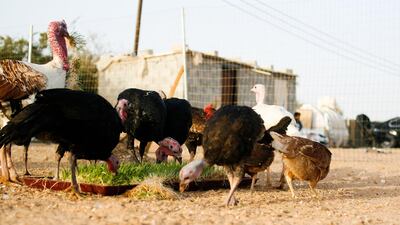During Ramadan we talked about the remarkable efforts the UAE has made to fulfil the four dimensions of food security - availability, utilisation, access, and stability - to ensure the nation’s 180-plus nationalities are fortunate enough to live as they would at home, by reproducing their culture and habits through the food they eat every day.
The one dimension where we need to show continuous vigilance is in stability, because, as a desert nation, about 80 per cent of our food supply comes from lands more amenable to food production, making it essential for the UAE to manage the risks generated by the laws, regulations and stability of source countries, including those where the UAE seeks to invest or has invested in the agri-food sector, in Africa, Latin America, or the Middle East. Part of the solution for us to be able to manage this risk in the long term, is to produce some of our food locally.
The current system the UAE Government and the national food industry employs keeps a healthy balance between self-sufficiency and imports. An important element of government support is the subsidies that remain in place on critical channels, such as poultry feed for commercial farms to encourage local production of fresh chicken, and support for dairy farms to ensure sufficient local supply of milk and related products.
As for the national food industry, we at Agthia have also recently stepped in to support local food production. Those smaller chicken producers who were finding it hard to compete following the withdrawal of animal feed subsidies are now producing chicken for Agthia’s own brand, which is then sold in our existing markets such as the municipality retail outlets and other government-employee stores.
These producers use Agthia’s Agrivita animal feed, which is produced in the UAE and does not contain hormones or antibiotics in accordance with UAE guidelines, resulting in high-quality animals. In this way, the combination of government support and the strategies and actions of the local food industry result in a stronger local food production ecosystem.
There are a number of initiatives that can be implemented that would further enhance our local industry.
Firstly, we need to better educate our local producers. We need to offer them more information on bio-security through stronger and more detailed training programmes, in order to avoid the potential spread of diseases on local farms. We also need to make our small and medium-sized producers better business people, by educating them on good management practices to improve performance and efficiency.
Secondly, we can be even more creative in incentivising international food producers to open food processing plants in the country. The UAE is a leading re-export hub for a region that is generally food deficient, so supporting a growing food industry can also boost our exports.
Indeed, some foreign companies have already set up or are establishing plants that process meat or bottled water. We may wish to target other producers: countries such as Mexico, for example, the world’s sixth-biggest beef producer, is seeking to diversify away from its main market, the United States, and into the Middle East, and plans to quadruple exports of halal beef by the end of 2018.
Thirdly, as many nations around the world do, including the US and those in the the EU, we can protect our local industries and local producers. One way to support them is to keep a close eye on violations of the UAE’s anti-dumping laws and regulations.
_______________
Read more:
Amazon wins regulatory and shareholder approval for Whole Foods deal
How the Digdagga Experimental Farm in RAK revolutionised regional agriculture in the 1960s
Water sourced from desert air – and it's no mirage
_______________
The Government is already active on this front; indeed, a law was approved earlier this year to protect domestic products from imports being sold for less than what is considered fair market value, through indirect taxes to balance prices or by allowing local companies to sue over unfair practices.
A next step might be a comprehensive approach to identify and support struggling producers under pressure to delay expansions, downsize, and even halt operations – perhaps by introducing and/or increasing tariffs on products that are already abundantly supplied domestically. After all, the failure of local producers could increase the nation’s dependence on foreign supplies and create an undesired imbalance between self-sufficiency and imports, while their financial and commercial health is a guarantee of the level of food security that the UAE currently enjoys.
And finally, a dedicated focus on local food production cannot be disassociated from the study of local food consumption.
Not enough is known about what people eat, and when, which makes it difficult to manage the country’s main food and lifestyle-related health issues: obesity; high lipids; hypertension; and diabetes. Indeed, for both food production and consumption, investing in advanced research is critical.
The UAE already has a great network of universities, research centres, and foundations dedicated to analysing the future of key technologies, and this network can be put to work to bring about a huge improvement in our understanding of food.
A research institute would contribute to making the agri-food sector in the UAE a regional and global leader by assisting the Government and the local food industry in strategy development; transforming scientific research into business solutions; providing data; and forcefully linking health issues with the way we produce and consume food. The UAE University’s Food and Agriculture College would be a great, but not the sole, location for this research centre. I am sure that private sector players would also contribute to its funding.
In conclusion, the UAE is lucky to have both a robust food security framework and a developed local production ecosystem. Let’s take the latter to the next level through what we do best – good business sense, targeted government intervention, and an investment in knowledge.
Tariq Al Wahedi is the chief executive of Agthia, a major UAE food and beverage company

